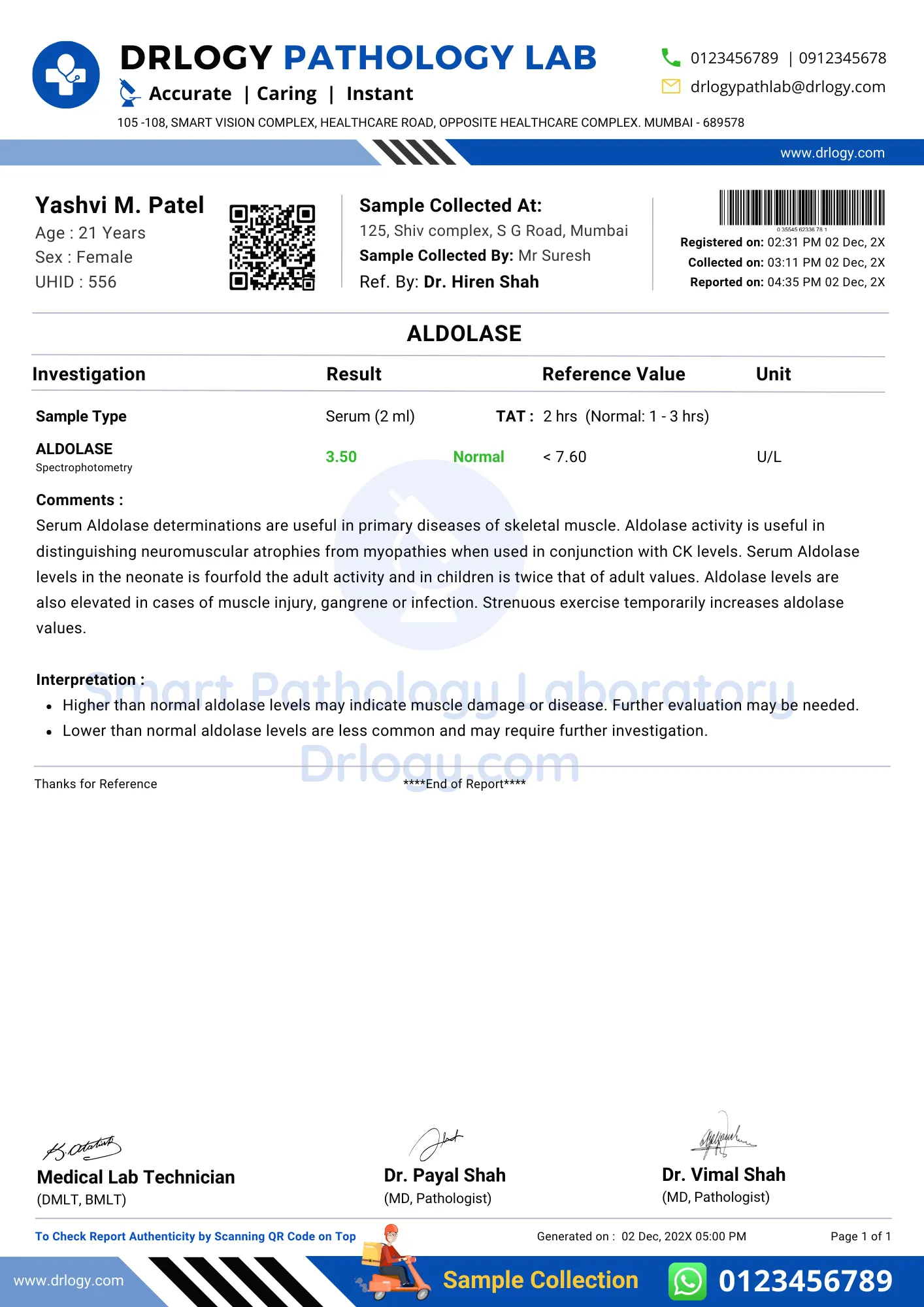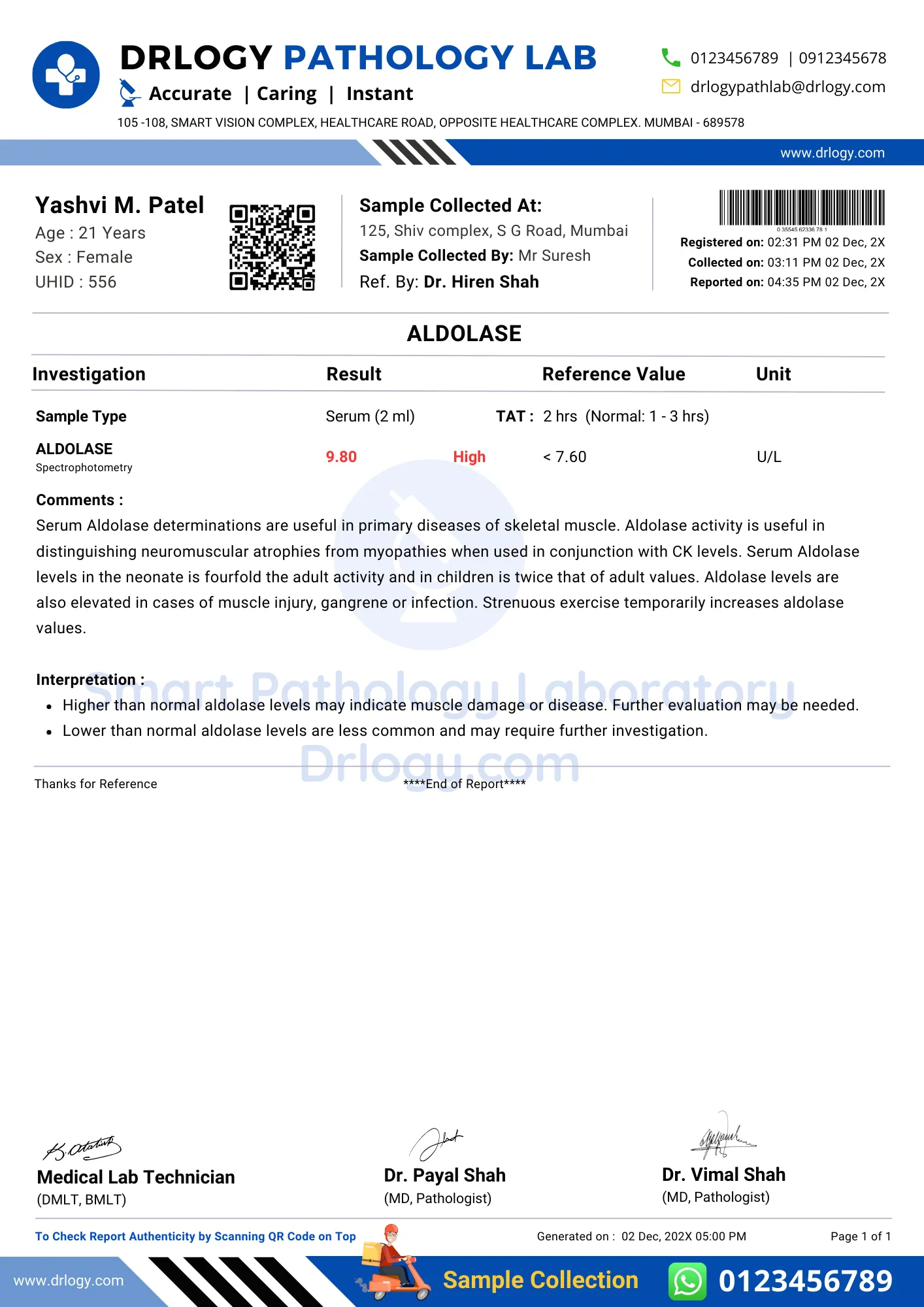
Aldolase Test For Muscles and Organs Damage
The aldolase test is used to diagnose and monitor certain conditions that damage the skeletal muscles and organs. Aldolase testing may reveal muscle or organ damage that has occurred due to injury or a condition that affects the muscles or organs.
Aldolase Test
Here are the basic details for the Aldolase Test.
| Also Known As | ALT Test |
| Type | Blood Test |
| Purpose | Checks level of aldolase enzyme in the blood |
| Sample Type | Blood |
| Preparation | No Special Preparation Required |
| Fasting | No |
| Gender | All |
| Age-Group | Any |
| Normal Value | 1.0 - 7.5 U/L |
| Reporting Time | 2 Hours |
| Cost | 700 - 1200 INR* |
*Price range may vary as per location, lab type, and procedure of lab test.
Aldolase Test Means
The aldolase test measures the level of aldolase enzyme in the blood.
- Aldolase is an enzyme involved in carbohydrate metabolism.
- The test is commonly used to diagnose and monitor muscle damage or disease.
- Elevated levels of aldolase can indicate muscle injury or conditions such as muscular dystrophy or polymyositis.
- The test is typically performed through a blood sample collection and can help in the evaluation and management of muscle-related disorders.
Aldolase Test Purpose
Here is basic purpose of the Aldolase Test.
- Assess and monitor muscle damage or disease.
- Aid in the diagnosis of muscle-related conditions such as muscular dystrophy or polymyositis.
- Evaluate the effectiveness of treatment for muscle disorders.
- Help differentiate between muscle and non-muscle-related causes of elevated enzyme levels.
- Assist in the overall evaluation and management of muscle-related disorders.

Aldolase Test Preparation
Here is the basic preparation for the Aldolase Test.
Before Test
- Follow any instructions given by your healthcare provider, such as fasting requirements.
- Inform your doctor about any medications, supplements, or vitamins you are taking.
- Avoid strenuous exercise or activities that may impact muscle enzyme levels prior to the test.
During Test
- A blood sample will be collected, usually from a vein in your arm.
- The area where the needle will be inserted may be cleaned with an antiseptic.
- The blood will be drawn into a collection tube for analysis.
After Test
- You can resume your normal activities and diet unless instructed otherwise by your healthcare provider.
- Follow any additional instructions provided by your doctor regarding post-test care.
- Await the test results, which will be communicated to you by your healthcare provider.
Aldolase Test Procedure
Here is the basic procedure of the Aldolase Test.
Aldolase Test Result
Here is normal result information about Aldolase Test.
- Normal Range: The test results will provide a range of values considered normal for aldolase levels. If your result falls within this range, it indicates that your aldolase levels are within the expected range for a healthy individual.
- Elevated Levels: If your test result shows higher than normal levels of aldolase, it may suggest muscle damage or disease. Your healthcare provider will evaluate the result in the context of your symptoms and medical history to determine the underlying cause.
- Decreased Levels: Conversely, if your test result shows lower than normal levels of aldolase, it may indicate a less common condition that requires further investigation. Your healthcare provider will assess the result along with other factors to determine the appropriate course of action.
Aldolase Test Report

Aldolase Test Normal Report

Aldolase Normal Test Report PDF Format
Aldolase Test Abnormal Report

Aldolase Abnormal Test Report PDF Format
Aldolase Test Normal Range
Here is the normal range for Aldolase Test.
| Age Group | Aldolase Normal Range (U/L) |
|---|---|
| Adults | 1.0 - 7.5 |
| Children | 2.0 - 8.5 |
| Elderly | 1.5 - 7.0 |
Aldolase Test Interpretation
Here is the interpretation for Aldolase Test.
| Test Result | Interpretation |
|---|---|
| Within Normal Range | Aldolase levels are considered normal and healthy. |
| Elevated Levels | Higher than normal aldolase levels may indicate muscle damage or disease. Further evaluation may be needed. |
| Decreased Levels | Lower than normal aldolase levels are less common and may require further investigation. |
Specimen Requirements For Aldolase Test
Here are the specimen requirements for the Aldolase Test.
| Specimen | Serum or plasma |
| Volume | 0.5 ml |
| Container | Red-top tube or gel-barrier tube for serum |
Aldolase Test is Safe?
The Aldolase test is generally considered safe and carries minimal risks.
- It is a routine blood test that involves a simple blood sample collection.
- Some individuals may experience slight discomfort or bruising at the site of blood collection, but serious complications are rare.
When Do You Get Aldolase Test Results?
The turnaround time for Aldolase test results can vary depending on the laboratory and testing method used.
- In general, results are typically available within a 2 hours.
- Your healthcare provider will inform you about the specific timeline for receiving your test results.
Aldolase Test Limitation
Here are some possible limitations of the Aldolase Test.
- Non-specific marker for muscle damage or injury.
- Limited diagnostic value in isolation.
- Interpretation requires consideration of clinical context.
- False positives may occur in certain conditions.
- Not specific to a particular disease or condition.
Aldolase Test Risk Factors
Here is the potential risk factor of the Aldolase Test.
- Muscle disorders or diseases can increase the risk of abnormal Aldolase levels.
- Certain medications or drugs can affect Aldolase levels.
- Autoimmune conditions or systemic diseases may be associated with elevated Aldolase levels.
Doctor Recommendations After Aldolase Test Result
Here are Doctor recommendations or consult a specialist after Aldolase Test.
| Aldolase Test Results | Doctor to Visit | Reason |
|---|---|---|
| High | Rheumatologist | Muscle damage or autoimmune disorders |
| Normal | General Practitioner | Routine monitoring or general health |
| Low | Not typically required | N/A |
Aldolase Test Price
Here are the estimated Aldolase Test Price in India with top different cities:
| City | Price Range (INR)* |
|---|---|
| Mumbai | 700 - 1200 |
| New Delhi | 700 - 1200 |
| Bangalore | 800 - 1200 |
| Hyderabad | 700 - 1200 |
| Kolkata | 800 - 1200 |
| Pune | 800 - 1200 |
| Lucknow | 700 - 1200 |
| Noida | 800 - 1200 |
| Surat | 800 - 1200 |
| Gurugram | 700 - 1200 |
| Patna | 800 - 1200 |
| Chennai | 700 - 1200 |
| Jaipur | 800 - 1200 |
| Ahmedabad | 700 - 1200 |
*Prices are approximate and vary depending on a specific laboratory or healthcare facility.
Summary
Overall, Aldolase Test is a valuable tool in assessing muscle damage or disease, aiding in diagnosis, monitoring treatment effectiveness, and guiding management decisions for various muscle-related conditions. Also check Drlogy Test for detailed information about all medical tests for patients, doctors, scholers and medical students.
Reference




